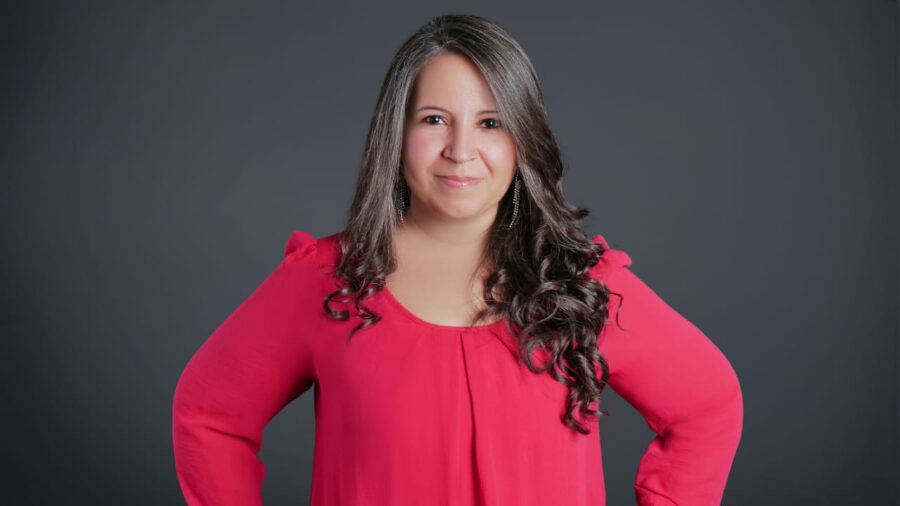Reim El Houni, Dubai Media Strategy Consultant & Advisor, Executive Producer of Expo2020’s TV Show ‘Studio Expo’ is old school.
Her career, spanning stints at the BBC, London Studios and Dubai One, taught her to keep an eye on the TV camera lens, not those on smartphones.
Being part of the industry for over 20 years, and having started her production group 11 years ago, Reim today is running different business brands that cater to different video needs.
Dubai Media Incorporated (DMI) appointed Reim based on her history with the host broadcaster and confidently knew they were in safe hands and the rest is history. The challenge of broadcasting live from Dubai to the world was laid square in her hands and together with her teams, they delivered.
“I started with TI22 films, my flagship firm and high-end brand, and we now work with broadcasters predominantly on TV shows, TV commercials, and large-scale projects,” Reim told Economy Middle East during a recent exclusive interview.
“We’re supporting a lot of thought leaders, experts, and CEOs, allowing them to find their voice and get it out there. It’s a big niche area gathering a lot of momentum, as C-suite executives are starting to realize the importance of them being on camera and self-representing their industries in that space. That’s what we do with Dubai On Demand.”
While old school for sure, Reim is not blind to social media and its global appeal to audiences.
“I have other brands that support in creating regular social media content, video content, animation, and anything that has to do with video,” Reim said.
Reim would expand that concept further at Expo 2020, bridging old and new while projecting broadcast’s continuing significance in mass media.

English broadcast to the forefront
Reim believes the region’s current landscape doesn’t focus a lot on western content and that digital presence is getting priority over mainstream TV shows.
“Nowadays, you jump straight on phone cameras or buy a DSLR camera to get visibility, but the skillsets required to pull off a TV show of this caliber are much different, so being old school helped secure Dubai’s Studio Expo,” Reim indicated.
Reim, who produced work for the opening of Burj Khalifa and the Dubai Film Festival, said Expo 2020 brought production to entirely new levels when it came to catering to global audiences over a sustained 6 months period.
“We did our best to showcase key themes at Expo 2020 such as sustainability, mobility, and opportunity, but if anything, it was the smaller stories, which the average viewer wouldn’t normally see, that had the biggest impact,” Reim revealed.
With 192 countries at the expo, bringing eyeballs to countries’ cultural, entertainment, and business prowess was no easy task.
“From highlighting the level of innovation and technology in Estonia to the amazing entertainment performances of Africa’s Eswatini nation, we exposed little-known facts about countries which created a massive appeal to audiences around the world,” Reim explained.

Local to global
The TV broadcast format at the expo had a multiplier effect on individuals, groups, and initiatives alike.
“Like the story of Sarah Brook who launched her charity called The Sparkle Foundation at the Dubai Cares pavilion, to enable individuals to support education and societies in Malawi. The event’s global platform meant attracting a huge influx of interest in her cause. A Ugandan entrepreneur called to thank us after he started getting dozens of business calls from Uganda, following an interview with him. Female Fusion, a group which spread their message of empowering women entrepreneurs, thrived during TV coverage of their activities,” Reim shared.
But it was topics like the UN’s sustainable development goals that the expo TV show took as concepts to the masses that brought awareness to global issues.
Suddenly the world was talking about the 17 SDGs and where they were heading. UAE’s 2023 hosting of COP 28 on climate change was also hotly debated and covered, given that the expo’s sustainability themes shared common interests with COP 28, according to Reim.

Video content trends
“The biggest trend in video content is personalization. People want to feel you are speaking directly to them. That’s hard with broadcast media, but going live helped create a ripple effect,” Reim said.
“We were finding opportunities to communicate with fans via competitions or featuring their content on air. I became aware of a family in Australia, numbering 60, watching our show daily. We called them out by name on the show.”
But Reim knows that the discussion today is on social rather than broadcast.
“The show was streamed live on YouTube and had a lot of eyeballs there. But we also replayed the main discussions that people had on social media during the event,” Reim said.
Reim helped launch a hybrid format for live topics that merged social media and TV production.

Lens on Dubai: Stories untold
The expo showed how different countries could co-exist, and thrive in unison irrespective of geopolitics, ethnic differences, and beliefs.
“Broadcast has a role in reshaping views. There are many shows in Arabic that do so but not in English aimed at showcasing what the UAE has to offer,” Reim said.
“I would like to think, with Expo city being announced, that it would try to preserve that global cultural centerpiece. That’s what made it unique. It normalized a lot of differences and showed us how we can work together towards a unified world.”
Reim revealed that a lot of conversations are happening at the moment around producing TV shows, hoping that this triggers more English-language TV production and content.
“Miracles happen here. The speed of change is so amazing that it creates a different energy in the city. Everyone living in the UAE is motivated and inspired to get things done, and while it may seem impossible, sometimes, it still happens. Magically,” Reim said.
“The stories of the people working tirelessly behind the scenes, of what makes this magic possible, is what needs more attention from TV.”








